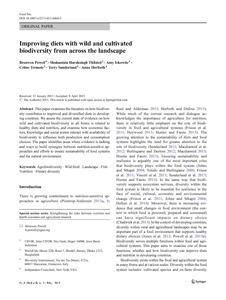About Springer
Throughout the world, we provide scientific and professional communities with superior specialist information – produced by authors and colleagues across cultures in a nurtured collegial atmosphere of which we are justifiably proud.
We foster communication among our customers – researchers, students and professionals – enabling them to work more efficiently, thereby advancing knowledge and learning. Our dynamic growth allows us to invest continually all over the world.
We think ahead, move fast and promote change: creative business models, inventive products, and mutually beneficial international partnerships have established us as a trusted supplier and pioneer in the information age.
Members:
Resources
Displaying 166 - 170 of 1195Improving diets with wild and cultivated biodiversity from across the landscape
This paper examines the literature on how biodiversity contributes to improved and diversified diets in developing countries. We assess the current state of evidence on how wild and cultivated biodiversity in all forms is related to healthy diets and nutrition, and examine how economic factors, knowledge and social norms interact with availability of biodiversity to influence both production and consumption choices.
Shift in herders’ territorialities from regional to local scale: the political ecology of pastoral herding in western Burkina Faso
In Burkina Faso, livestock sedentarization programmes are still at the top of policy makers’ agendas and at the heart of their discourse, despite huge changes in land cover, land use and territorialities in rural areas. This paper contributes to the literature on the impact of livestock policies targeting the sedentarization of pastoralism in sub-Saharan Africa by specifically highlighting the territorial consequences of such policies.
Assessing plant protection practices using pressure indicator and toxicity risk indicators: analysis of therelationship between these indicators for improved risk management, application in viticulture
The excessive use of plant protection products (PPPs) has given rise to issues of public and environmental health because of their toxicity. Reducing the use of toxic PPPs and replacing them with products that are less toxic for human health and the environment have become socially, environmentally and economically indispensable.
Bioenergy and African transformation
Among the world’s continents, Africa has the highest incidence of food insecurity and poverty and the highest rates of population growth. Yet Africa also has the most arable land, the lowest crop yields, and by far the most plentiful land resources relative to energy demand. It is thus of interest to examine the potential of expanded modern bioenergy production in Africa. Here we consider bioenergy as an enabler for development, and provide an overview of modern bioenergy technologies with a comment on application in an Africa context.
Stormwater ponds can contain comparable biodiversity to unmanaged wetlands in urban areas
Urban freshwaters provide a range of ecosystem services, including stormwater management, water treatment, biodiversity, and aesthetics. Management of freshwaters should aim to maximise as many of these services as possible, but managers are often focused on individual services. To test for the biodiversity value of stormwater management ponds (SMPs) in Ottawa, Canada, 20 SMPs were surveyed for macroinvertebrates using standardised sampling techniques.



